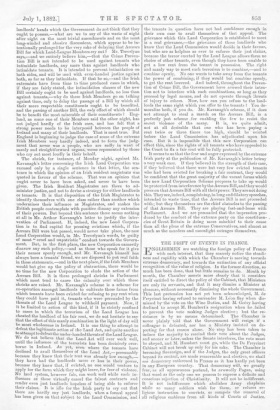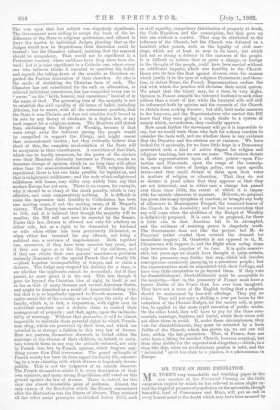THE DRIFT OF EVENTS IN FRANCE.
ENGLISHMEN- are watching the foreign policy of France with such interest, that they scarcely notice the steadi- ness and rapidity with which the Chamber is moving towards extreme democracy, and towards the extinction of any official recognition of the value of religion. In the former direction, so much has been done, that but little remains to do. Month by month, the Chamber asserts more clearly that it considers itself entitled to direct the policy of the Cabinet, that Ministers are only its servants, and that it may dismiss a Minister at pleasure, without necessarily dismissing the whole Government. This last pretension has not yet been acknowledged, M. de Freyoinet having refused to surrender M. Ldon Say when dis- missed by the vote on the Wine Duties, and M. Grdvy having declined to accept M. Humbert's resignation when he .failed to prevent the vote making Judges elective ; but the re- sistance is by no means determined. The Chamber is never plainly told that the Government will resign if a colleague is defeated, nor has a Ministry insisted on de- parting for that reason alone. No step has been taken to induce the majority to rescind their vote about the Judges, and sooner or later, unless the Senate interferes, the vote must be obeyed, 0,nd M. Humbert must go, while the De Freycinet Cabinet will not break up only for his sake. The Chamber is becoming Sovereign, and if the Judges, the only great officers beyond its control, are made removeable and elective, we shall see democracy enthroned in France as it has hardly yet been in any European country. That democracy will, we greatly fear, as all appearances portend, be avowedly Pagan, using that word as the only one we possess to express a definite and conscious rejection of Christianity. It will not be indifferent. It is not indifference which abolishes Army chaplains while so many soldiers wish for them, or refuses re- ligious instruction to convicts, or compels the removal of all religious emblems from all kinds of Courts of Justice.
The vote upon that last subject was singularly significant. The Government were willing to accept the basis of the in- difference of the State to religious professions, and offered to leave the matter to individual Judges, pleading that as the Judges would now be Republicans, their discretion could be trusted ; but the Chamber refused, insisting that the removal should be compulsory. That would not be significant in a Protestant country, where emblems have long since been dis- used; but it is most significant in a Catholic one, where every one who believes thinks it essential to manifest his belief, and regards the taking-down of the crucifix as Cavaliers re- garded the Puritan desecration of their churches. So also is the mode of abolishing the Christian form of oath. The Chamber has not substituted for the oath an affirmation, or relieved individual consciences, but has compelled every one to " swear " on his "faith, honour, and conscience," instead of in the name of God. The governing idea of the majority is not to establish the civil equality of all forms of belief, including Atheism, but to assert, with all the vehemence possible, that the State is non-Theistic, and does not consider itself bound in its acts by any theory of obedience to a higher law, or any tacit respect for a religious system. The Members still shrink from abolishing the Budget of Worship, because if that were, swept away the believers among the people would be compelled to support the Clergy, and might resent that unaccustomed burden ; but they evidently believe that short of this, the complete secularisation of the State will be acceptable to their constituents. A conviction of that kind, which can be hardly erroneous, for the power of the electors over their Members distinctly increases in France, marks an immense change of opinion, which in no long time will affect other than the semi-ecclesiastical laws. With religion flatly repudiated, there is but one basis possible for legislation, and that is enlightened selfishness ; and the code which enlightened selfishness will frame, may differ very widely from any that modern Europe has yet seen. There is no reason, for example, why it should be so chary of the death penalty, which is very effective, and costs comparatively nothing. It is difficult to resist the impression that hostility to Catholicism has been one moving cause, if not the moving cause, of M. Naquet's victory. That Deputy has carried his law of divorce by 336 to 150, and it is believed that though the majority will be smaller, the Bill will not now be rejected by the Senate. Under this law, divorce is allowed not only for adultery on either side, but as a right to be demanded by husband or wife when either has been persistently ill-treated, or when, either has incurred for any offence, not being a political one, a sentence of imprisonment. Both together can, moreover, if they have been married two years, and if they can agree as to the disposal of the children, and if they can obtain their own parents' sanction—a provision curiously illustrative of the special French idea of family life —plead hopeless incompatibility of temper, and so claim a divorce. The Judge may suspend his decision for a time, to see whether the applicants cannot be reconciled ; but if they persist, he must grant it in the end. This law, though it goes far beyond the Christian idea of right, in itself is not so lax as that of many German and several American States, and might be described as a result of democratic feeling only, but that it is so hopelessly opposed to French manners. The entire social life of the country is based upon the unity of the family, which is, in fact, a corporation, with rights over its individual members and a definite claim to control their management of property ; and that, again, upon the indissolu- bility of marriage. Without that guai antee, it will be alraost impossible to maintain thoie parental rights to which French- men cling, which are protected by their laws, and which are recorded in so strange a fashion in this very law of divorce. How are parents, themselves divorced, to forbid either the marriage or the divorce of their children, or, indeed, to main- tain towards them in any way the attitude enforced, not only by French law, but by French opinion, which forgives any- thing sooner than filial irreverence. The grand antiseptic of French society has been its keen regard for family life, amount- ing to a true clanship, with which divorce is hopelessly incom- patible. This is not the judgment of an outside observer. The French themselves admit it in every description of their own manners, and many strong Republicans still voted on this ground against the law of divorce. There is, indeed, for this view one almost irresistible piece of evidence. Almost the only victory of the Revolution which the French surrendered after the Restoration was the liberty of divorce. They retained all the- other social principles established before 1815, such as civil equality, compulsory distribution of property at death, the Code Napoleon, and the conscription, but they gave up this one without a contest. That may be attributed to the influence of the Church, but the Church was defeated on a hundred other points, such as the legality of civil mar- riage, which are at least as near to its heart, but whioh had not so strong a defence in the manners of the people. It is difficult to believe that so great a change, so foreign to the thought of the people, could have been carried without an additional impulse, which was hostility to the Church. Rome sets its face like flint against divorce, even for reasons which justify it in the eyes of religious Protestants; and there- fore, to defeat Rome, the French Representatives endure the .risk with which the practice will threaten their social system. We admit that the hijury may, for a time, be very slight. Opinion in France compels the betrayed husband to seek other redress than a court of law, while the betrayed wife will still be influenced both by opinion and the counsels of the Church to abstain from seeking divorce ; but still, laws make manners in the long-run, and the Representatives who carried this Bill knew that they were giving a rough shake to a system of society which, nevertheless, they cordially approve.
How much farther the movement will go it is impossible to say, but we would warn those who look for a sharp reaction to consider the facts well, and see whether there is any evidence that the Deputies and the electors are at variance. We have looked for it anxiously, for we have little hope in a Democracy penetrated with a kind of active disgust for religion and religious teaching, but we can see none. The electors dictate to their representatives upon all other points—upon Pro- teetion and Free-trade, upon the range of the conscrip- tion, upon their views of foreign policy, even upon specific taxes—and they could dictate to them upon their votes in matters of religion or education. That they do not so dictate is proof either that they approve or that they are not interested, and in either case a change has passed over them since 1852, the extent of which it is impose siblo for outside observers to measure. Hitherto, no proposal has given rise to any symptom of reaction, or brought any body of adherents to Monseigneur Freppel, the standard-bearer of the Church in the Assembly ; and we feel no conviction that any will come when the abolition of the Budget of Worship is definitively proposed. It is sure to be proposed, for there is little else in that direction left to be attempted, and the evidence of resisting power is singularly weak. The Government does not like the project, but M. de Froycinet rather evaded than resisted the demand for immediate inquiry ; M. Gambetta is not opposed to it, l'er, 016menceau will support it, and the Right when acting alone only increases the impetus of its foes. Ibis quite conceiv- able, ten years ago we should have thought it quite certain, that the peasantry may dislike this step, which will involve consequences excessively annoying to a penurious people ; but the representatives must be acquainted with their feelings, and have very little temptation to go beyond them. If they vote for disestablishment, disestablishment must be acceptable to the majority,—that is, the peasantry of France must have a keener dislike of the Cures than has ever been imagined. They have not a trace of the English feeling that a religion should be maintained by free-will offerings. They pay no tithes. They will not save a shilling a year per house by the extinction of the Clerical Budget, for the money will, in prac. tice, be applied to the more rapid execution of public works. On the other hand, they will have to pay for the three cere- monials, marriage, baptism, and burial, which their wives will not allow them to avoid. If, under those circumstances, they vote for disestablishment, they must be actuated by a keen dislike of the Church, which has grown up, no one can tell how, within the last generation. That, in France, does not arise from a liking for another Church, however sceptical, but from clear dislike for the supernatural altogether,—which, in a time like this, when no revolutionary passion is astir, and the " industrial " spirit has risen to a passion, is a phenomenon in Europe.



































 Previous page
Previous page